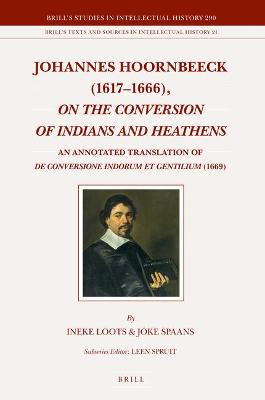Brill's Studies in Intellectual History / Brill's Texts and Sources in Intellectual History
1 total work
290-21
Johannes Hoornbeeck (1617-1666), On the Conversion of Indians and Heathens
by Ineke Loots, Joke Spaans, and Johannes Hoornbeeck
Published 22 November 2018
Exploration, trade and conquest expanded and upset traditional worldviews of early modern Europeans. Christians saw themselves confronted with a largely heathen world. In the wake of Iberian colonization, Jesuits successfully christianized heathen populations overseas.
In his De conversione Indorum et gentilium, Johannes Hoornbeeck presents a systematic overview of every aspect of the missionary imperative from a Reformed Protestant perspective. The most attractive part of his book may be the global survey it offers of the various types of heathens, an early example of comparative religion. Of equal interest, however, is his critical approach to mission.
Hoornbeeck rejects ecclesiastical hierarchy and top-down imposition of Christianity. In this he is perfectly orthodox, and at the same time startlingly original and a harbinger of modern missions. His practical recommendations offer a flexible framework for missionaries, to fit a wide variety of circumstances.
In his De conversione Indorum et gentilium, Johannes Hoornbeeck presents a systematic overview of every aspect of the missionary imperative from a Reformed Protestant perspective. The most attractive part of his book may be the global survey it offers of the various types of heathens, an early example of comparative religion. Of equal interest, however, is his critical approach to mission.
Hoornbeeck rejects ecclesiastical hierarchy and top-down imposition of Christianity. In this he is perfectly orthodox, and at the same time startlingly original and a harbinger of modern missions. His practical recommendations offer a flexible framework for missionaries, to fit a wide variety of circumstances.
